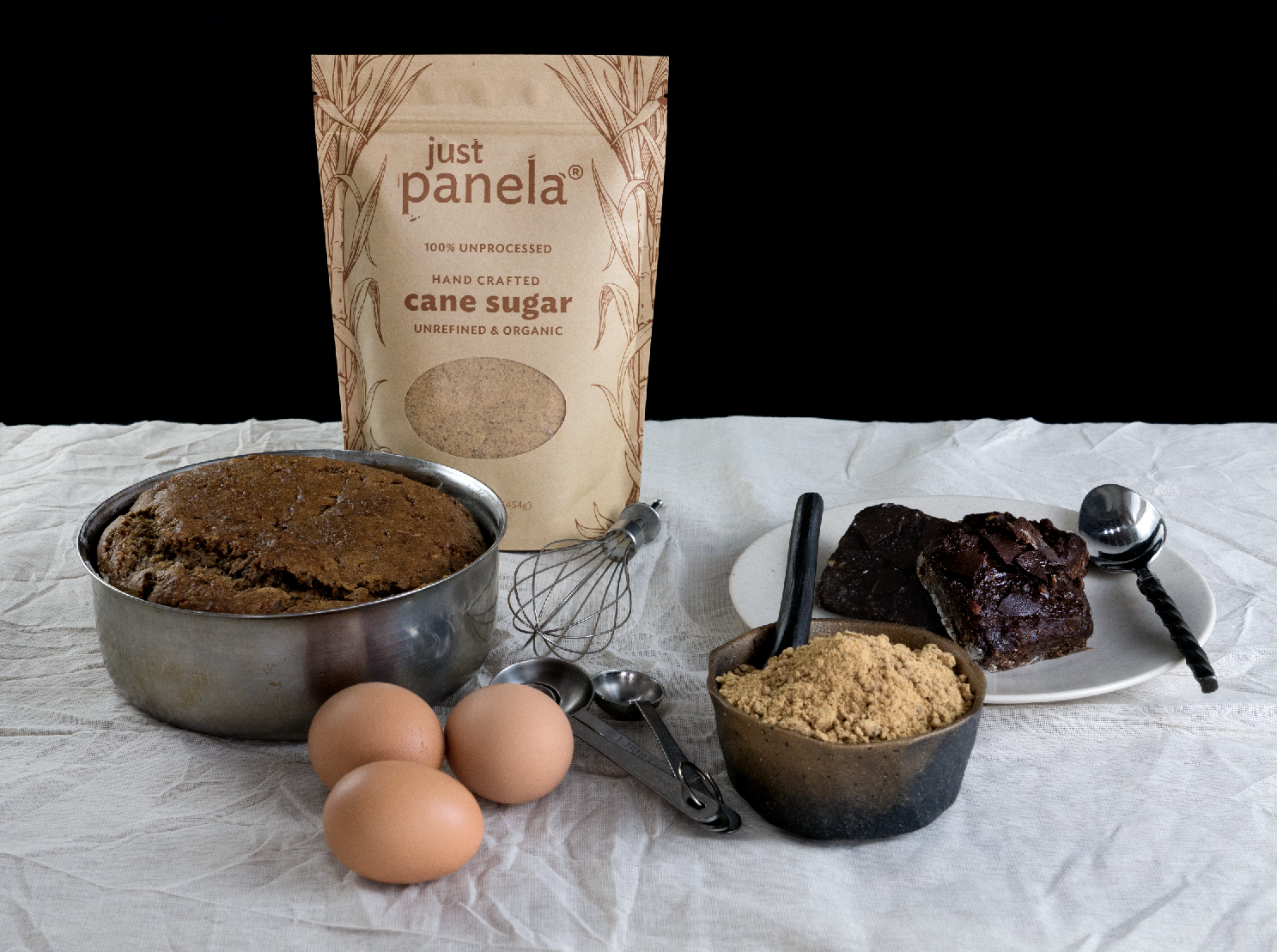A Quick Company History.
Left to right: Scott Unkefer (CEO, Founder), Ivan Vasquez (Partner and a leading “Panela”/ Cane Sugar expert in Colombia), Robert Thomas (Co-Founder), Diomes (Packaging Manager), Roosber (Packaging)
When Just Panela’s founder first moved to Colombia in 2010, he encountered a unique unrefined form of cane sugar, otherwise known as “panela.” Usually sold in blocks that must one must break down with a knife or cheese grater, panela is consumed daily in the morning with hot water (“agua panela”) and at lunchtime with cold water and lime juice (“guarapo”).
Our founder recognized that Panela could provide an organic alternative to artificial sweeteners and highly processed modern sugars available to American consumers. With the help of a co-founder, the two subsequently started Just Panela in 2013 in an effort to bring Panela, preferable in both taste and texture, to the American market. The company objective is to replace brown, white, and turbinado sugar in all areas of specialty coffee and tea, food and beverage products, baking, food service, natural, gourmet, and grocery.
Just Panela asks; why was sugar refined in the first place? The answer is that industrial sugar has no choice but to be refined due to the industrial collection process used by big sugar. It’s a dirty process that requires cleaning and filtering, involving multiples of chemicals as well as cow bone char! Just Panela, on the other hand is machete cut by hand, and kettle cooked by hand to allow sugar cane to retain its natural mineral content and teroir.
What grows together goes together.
At Just Panela we strongly believe in the philosophy that “what grows together goes together.” Our USDA Certified Organic unrefined cane sugar from Colombia, otherwise known as ‘panela,’ is sourced in the same region where your Colombia Arabica beans are grown. Panela’s robust, earthy taste makes it the best sweetener available for coffee and tea.
The Most Nutritious Cane Sugar
Why consume panela over regular refined sugar? Well, apart from its delicious taste, panela actually has nutritive properties that make it a healthier choice than other sugars and sugar substitutes.
Refined and crystallized sugars undergo a multi step process that flushes out the vitamins and minerals found in the sugarcane plant. Panela is a non-centrifugal sugar. Due to its lack of processing it retains much higher quantities of nutrients including magnesium, iron, calcium, manganese, and potassium.
The Hand Crafted Process
Just Panela cane sugar is to turbinado and other cane sugars what Pink Sea Salt is to regular salt. What unrefined honey is to refined honey. As a grass, this means handling and crafting the product by hand.
Cooking, Baking, and Recipes
Panela, in the correct cooking applications, brings an incredible richness and smoothness to the sweet side of the five basic tastes.
Stay tuned on Facebook for new recipe ideas: https://www.facebook.com/justpanela/
Uses
We have food and beverage product companies, retailers, trained gourmet and farm-to-table chefs and home users using Just Panela's cane sugar for:
Beverages:
Espresso, Coffee, & Tea (iced and hot), Smoothies & Blended Juices, Chai, Guarapo, Agua Panela, and Alcohol Drink Mixing.
distilling and moonshining:
We have multiple accounts with small and large distilleries and moonshiners around the country.
Cooking, grilling & Baking:
Chocolates, Sugar Cookies, Breads, Desserts, Waffles, Pies, BBQ Sauces, and Rubs.
Retail and distribution:
Whole Foods Market, Publix, UNFI , KEHE, Natural Grocers, Juan Valdez Cafe, Wegmans, and others nationwide.
Community Development
With the assistance of community leaders, Just Panela is focused on designing and implementing effective community development programs aimed at long term sustainability. Fantastic opportunities exist to achieve this objective by working with communities to design and develop projects.
Some of the Earth's greatest landscapes are available for sustainable development. We aim to promote projects with favorable opportunities for communities, but we cannot achieve our goals alone. Find out how you can help.
For more information, reach out to our friends at PANELA FOR PEACE:
How it is made.
Just Panela is a hand cut sugarcane product from the hills of Southern Colombia. Once the sugarcane is hand cut, it is then cold pressed to extract the sweet juice. Once cold pressed, it is dehydrated into a golden brown, powdery, unrefined, unprocessed, raw sugar.










